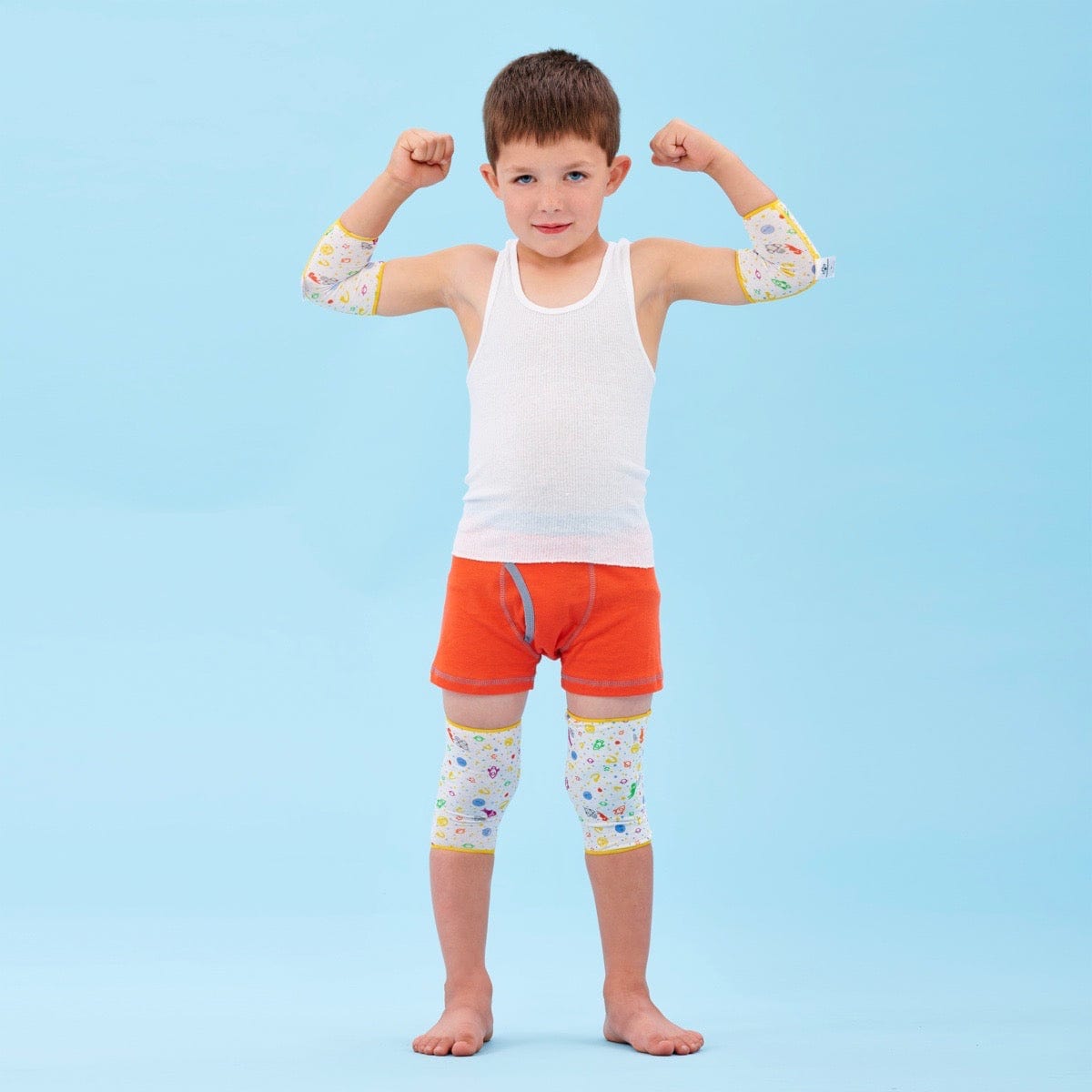There have been numerous research studies completed that have shown a strong relationship for babies and children with skin disorders like eczema, also known as atopic dermatitis, to most often have a family history of eczema, asthma, allergies or what is sometimes called allergic eczema, allergic contact dermatitis or a skin allergy. They also have a much higher chance of developing environmental allergies and food allergies, as well as asthma.
In a landmark 2017 study, Dr. Johnathan Spergel, the chief of the allergy section at Children’s Hospital of Philadelphia (CHOP) and a member of the National Eczema Association Scientific Advisory Committee and his colleague David A. Hill, MD, PhD, an allergist at CHOP analyzed a group of over 130,000 babies born in a period over a year to test the theory that a child with one allergic disease is more likely to develop a progression of one or more additional allergic diseases. The results confirmed a typical childhood progression to first develop eczema or atopic dermatitis, followed by an anaphylactic food allergy, then a respiratory allergy, such as asthma, Dr. Hill said.
Frequently eczema leads to asthma and other allergies: What are the different types of allergies affected by eczema?
Commonly known as the atopic march which usually begins the diagnosis of eczema during infancy (around 5 months old), followed by food allergy, allergic rhinitis (also known as hay fever) and asthma, typically in that order during childhood. Many doctors call these three conditions -- eczema, allergies, and asthma -- the atopic triad because they are so closely related. This study also revealed that kids that develop eczema are more likely to be diagnosed with food allergies like dairy, soy, nuts, shellfish, wheat and gluten and/or environmental allergies to pollen, dust mites, pet dander, and mold or asthma by the age of 1.
How likely is it that my child with eczema will develop other allergies? Facts for kids with eczema and allergies:
- Up to 80% of kids with eczema develop hay fever or asthma later in childhood.
- 37% of children who develop eczema (moderate to severe) have food allergies.
- 35% of adults with asthma also had eczema as a kid.
- 33% of the children born to mothers with allergies have eczema.
Do food allergies cause eczema in children?
The answer to this seemingly simple question is more complicated than a yes or no. Research cited by the American Academy of Dermatology and a July 2013 study published in the Journal of Investigative Dermatology indicates that the majority of people with both eczema and food allergies, eating a food they are allergic to does not cause a skin rash to flare. But a baby that develops eczema or people with severe eczema is more likely to have an eczema flare by eating certain foods.
What causes eczema flare-ups?
The term eczema refers to several different skin conditions in which the skin is red and irritated and sometimes has small, fluid-filled bumps that become moist and ooze. The most common type of eczema is atopic dermatitis (sometimes called infantile eczema or allergic contact dermatitis), which affects older kids as well as infants. The skin conditions symptoms can resemble an allergy, but it is not a true allergic reaction. The red, dry skin irritation is a skin condition due to a defect in the skin barrier, which allows allergies to get into the body and cause immune dysregulation. Most medical professionals agree that the cause of eczema in kids is really the result of a combination of different factors:
- Genetics, family history of eczema, asthma and food allergies increases the potential for having children with eczema
- Abnormal function of the immune system
- Environment conditions such as heat, cold, humidity levels
- Activities, exertion, anxiety, and stress may cause the skin to be more sensitive
- Defects or alterations in the skin barrier that allow essential water (or moisture) to escape out and environmental allergens (like those from pollen, dust mites, and food) and germs into the skin.
Can allergic reactions trigger eczema flare-ups and how painful is eczema?
The answer is yes, there are everyday materials in the environment that can cause you to have an allergic reaction and trigger an eczema flare up! When a child has eczema, the child's skin is extremely sensitive and can be very painful as a result. The more sensitive the skin, the more susceptible it is to triggers.
Eczema is clearly connected to allergic conditions like food allergies, hay fever, and asthma. Eczema flares from very common things that cause an allergic reaction like seasonal pollen, dust mites, pet dander from cats and dogs, mold and dandruff. Your body's immune system overreacts to substances, called allergens, that are usually not harmful. You might get hives, itching, swelling, sneezing, and a runny nose.
Studies have also shown that children with eczema symptoms have a breakdown in their skin barrier that makes their odds higher for getting food allergies. Proteins from eggs, cow’s milk, soy, certain nuts, wheat, and gluten caused their immune system to react.
However, it is important to recognize that atopic dermatitis triggers are not just allergens, but most likely a combination of skin conditions like dry skin, irritants, anxiety, and stress.
What are the best treatments for eczema and allergies?
- Skin Care - The best line of defense against and to treat eczema and related skin conditions and rashes is protecting and hydrating the skin with special ways of treating eczema including baths that keep the skin hydrated, topical medications and moisturizers and covering the skin with therapeutic eczema clothing like Soothems.
There are some other things you can do that might lower your child's chances of worsening or treat eczema, asthma, and allergies. The results are not always the same for every child with eczema, so talk to your dermatologist or your pediatrician before trying any of these:
- Breastfeeding – according to studies by the American Academy of Pediatrics (AAP) and the American College of Obstetricians and Gynecologists, have shown that breastfeeding helps to increase the immune system during the first 12 months of life and may lower the chance of eczema (or severity), allergies and asthma later.
- Antihistamines – independent clinical trials found that oral antihistamines do not directly help eczema or treat itch associated with eczema but do, according to the AAD, help relieve eczema aggravated sleep deprivation. Over the counter antihistamines, such as diphenhydramine (Benadryl) and chlorpheniramine (Chlor-Trimeton), affect the brain and can cause side effects like drowsiness which will make your child sleepy and are most beneficial if the eczema symptom of itchy skin is keeping you from sleeping. Your doctor can also prescribe hydroxyzine (Atarax) and cyproheptadine.
-
Corticosteroid cream – there are some helpful 1% solution corticosteroid creams sold over the counter like Vanicream HC help the eczema flare-up to settle.
-
Allergy shots – depending on the specific allergic eczema symptoms allergy shots can help some patients with eczema by working to modify the course of the disease rather than simply treating symptoms. Allergy shots are not the same as steroid shots or steroid injections. Your allergist/immunologist can discuss whether allergy shots are appropriate for your eczema.
Do Eczema Pajamas and Clothes Work?
Yes, specialty clothing like Soothems Eczema Pajamas made from skin smart textiles like TEWLTect eczema fabric does work. TEWLTect fabric is made from a special TENCEL fiber embedded with the anti-bacterial biopolymer Chitosan and the fabric is coated in Zinc Oxide. The fabric not only acts as an occlusive barrier to protect the surface level of the skin deficient with the gene called filaggrin, a protein that keeps the skin moist but also causes a dysfunctional skin barrier that lets in contact and airborne allergens like dust mites, dander, and pollen. Common triggers for asthma, hay fever, and other allergic flares according to a research study published in the US National Library of Medicine – National Institute of Health.





Leave a comment
All comments are moderated before being published.
This site is protected by hCaptcha and the hCaptcha Privacy Policy and Terms of Service apply.